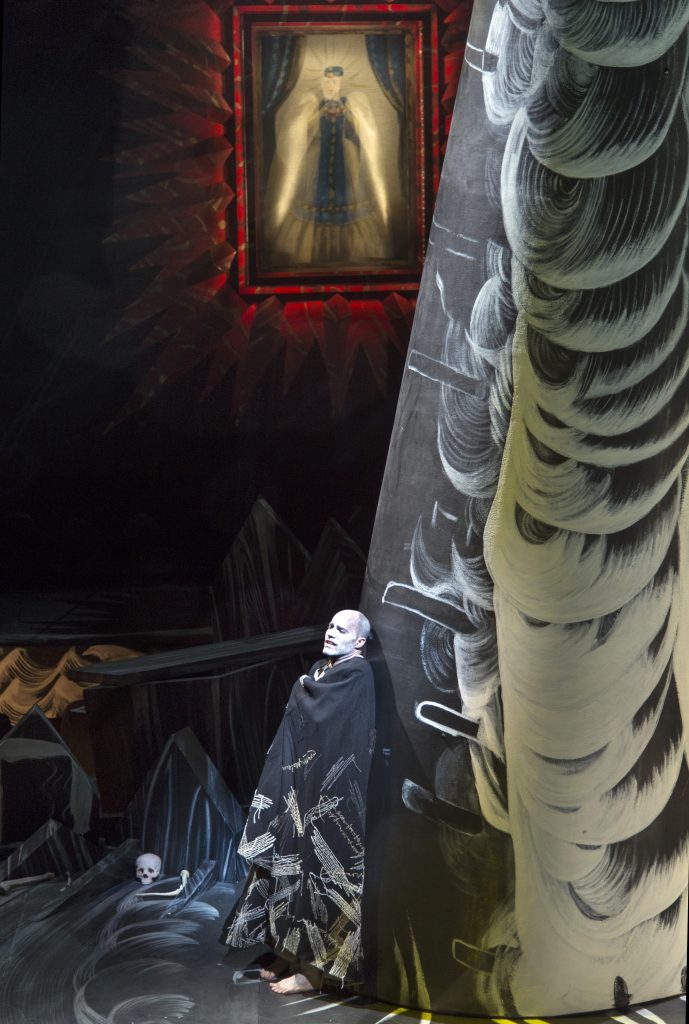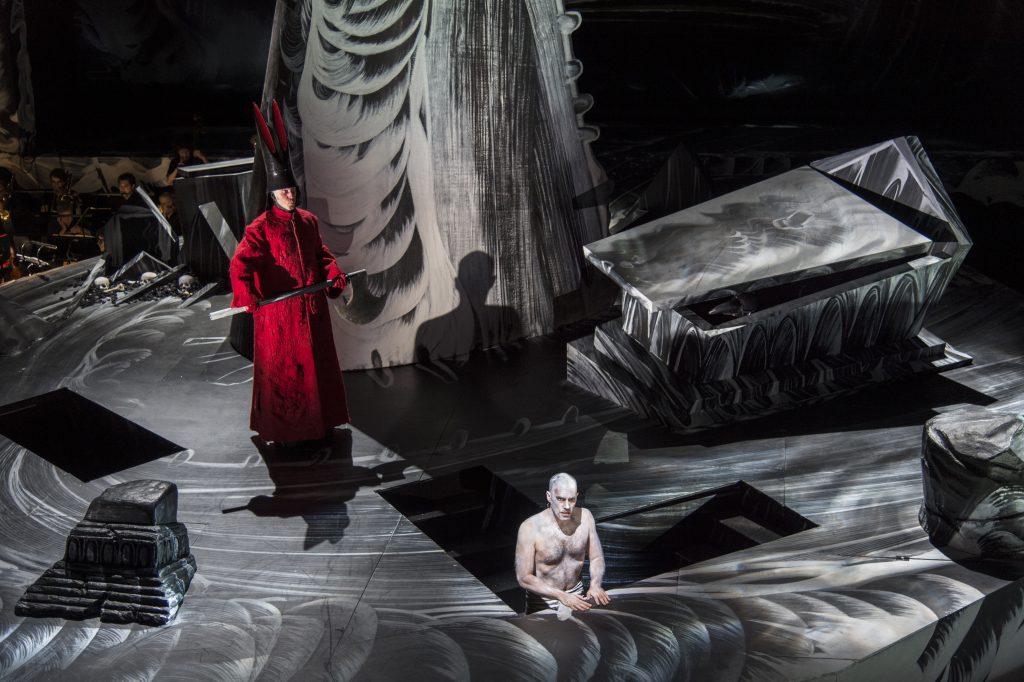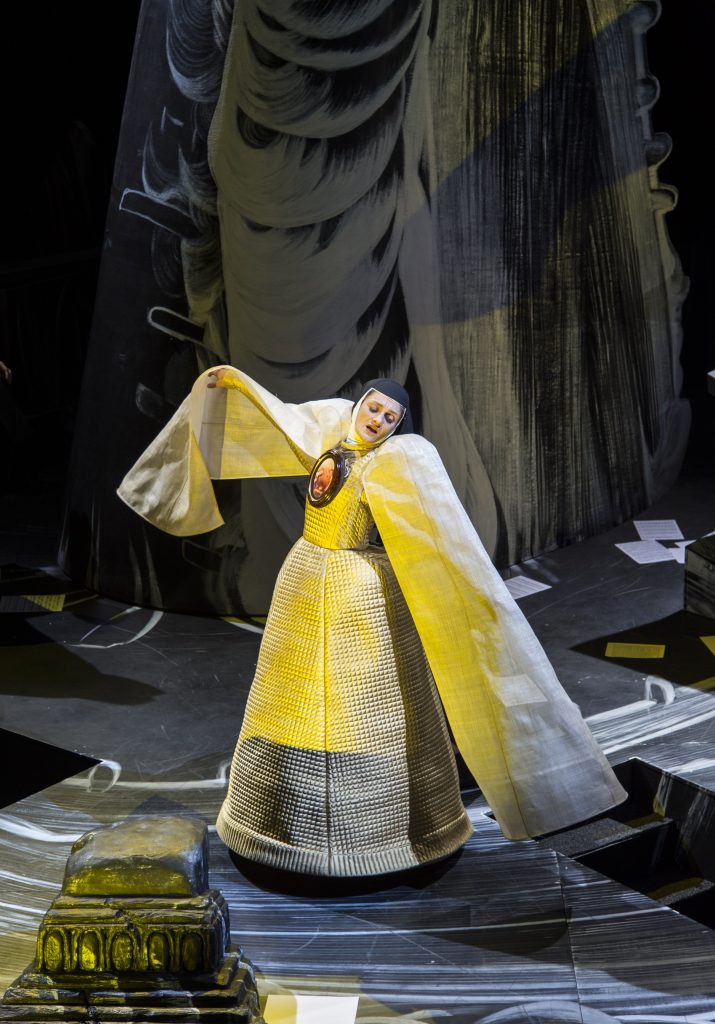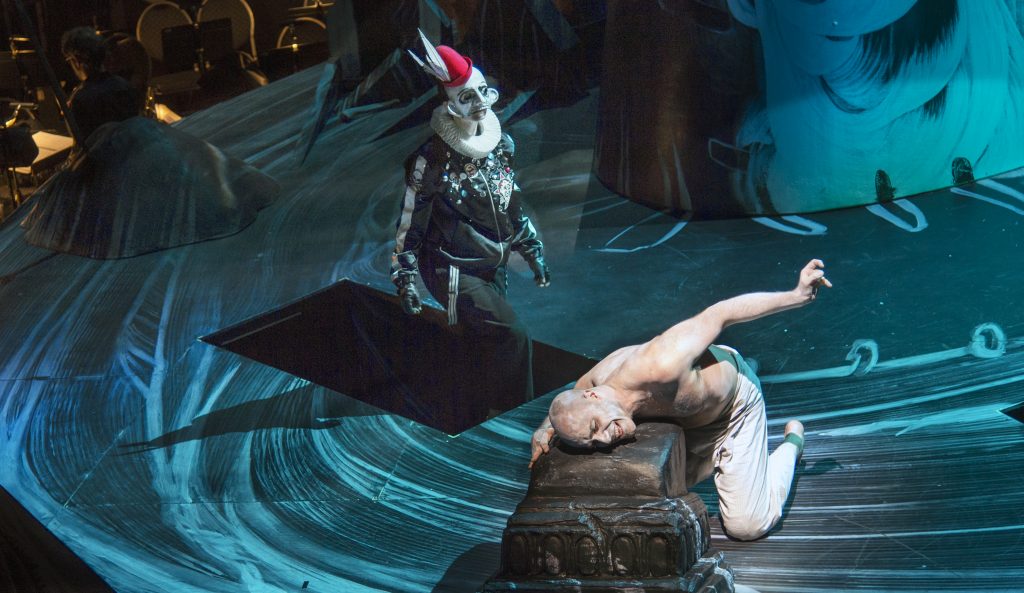Maarten Baanders zag een opera die een eiland bleef.
Een allesweter was Athanasius Kircher (1602 – 1680). Geen enkel verschijnsel in het universum kon zich aan zijn onderzoeksdrift onttrekken. Een universeel geleerde was hij, maar ook een fantast. Vandaar dat hij niet meetelt in de wetenschap. Maar voor een groteske opera kun je je bijna geen aantrekkelijker hoofdpersoon voorstellen.

Louis Andriessen componeerde ‘Theatre of the World’ op een libretto van Helmut Krausser. Het valt niet mee een leven waarin zo exuberant veel onderwerpen door het hoofd van de hoofdpersoon zijn gegaan in zeven kwartier te treffen. Krausser heeft ervoor gekozen Kirchers leven samen te trekken in diens laatste uren. Een grenssituatie. Het ultieme moment om zich af te vragen wat hij nu werkelijk van het leven gemaakt heeft. Kirchers gedachten krijgen urgentie.

De belangrijkste personages uit zijn leven omringen hem op een kerkhof in Rome: de paus (die onder de indruk was van zijn wetenschappelijke prestaties), zijn Amsterdamse uitgever Janssonius, een verliefd jong stel, een ietwat geheimzinnig jongetje dat telkens in zijn gedachtegangen inspringt, en op de achtergrond een door Kircher aanbeden non en dichteres, met de allure van een profetes: Sor Juana Inés de la Cruz.

Het verhaal verspringt telkens naar landen waar Kircher actief is geweest: Egypte, Mesopotamië, China, Mexico. Afgezien van het licht, dat doeltreffend de sfeer in het surrealistische decor laat veranderen, maakt deze springerigheid het moeilijk je in het verhaal in te leven. Het blijven panorama’s op afstand.
De urgente, groteske sfeer heeft helaas niet zo’n goede uitwerking in de speelstijl. Onafgebroken heerst dezelfde gespannenheid, met dik aangezet spel en overdadige gebaren. Natuurlijk zitten er komische momenten in, maar over het algemeen overheerst het klamme zweet. Dat vermoeit en is bovendien een tweede factor die maakt dat het schouwspel op grote afstand blijft staan.

Het libretto maakt het niet gemakkelijk. Ik heb het dan nog niet eens over de verschillende talen die door elkaar worden gebruikt. Dat is wel een mooie vondst, die aansluit op Kirchers belangstelling voor talen, en meer algemeen op de alomvattende sfeer waarin hij zijn wetenschap bedreef.
Maar wat stoort is dat de taal zo opgesloten blijft in een kamergeleerd zeventiende-eeuws sfeertje. Dat kan een erudiet genoegen verschaffen en levert spitsvondige momenten op, maar de vraag rijst: is ‘Theatre of the World’ een opera van onze tijd? De afgelopen decennia hebben we in het Westen geleefd met het idee dat we hard bezig zijn de hele wereld in onze wetenschappelijke en technische greep te krijgen. Dat is natuurlijk een waan. Een waan waar wel eens bij stilgestaan mag worden. Natuurlijk moet een kunstwerk niet letterlijk de actualiteit becommentariëren. Maar de potentie van kunst ligt erin dat zij raakvlakken, onverwachte invalshoeken kan bieden om vastgeroeste zekerheden los te schudden.
Gemiste kans
Dat het Faust-achtige verhaal van Kircher zo ver van de eenentwintigste-eeuwse denk- en belevingswereld is geschreven, is een gemiste kans. Ook al kies je voor het groteske, dan nog moet je het besef kunnen overbrengen dat leven en werk van een man als Kircher een licht werpt op onze moderne mentaliteit. ‘Theatre of the World’ is een eilandopera. Je ziet haar in de verte en kunt maar niet dichterbij komen, terwijl je dat wel wilt. De muziek is namelijk zo prachtig en spannend en is met zijn nergens voorspelbare karakter als een weids en afwisselend landschap waarin de mens zijn weg moet zoeken. Ook de vocalisten laten veel sterke kanten zien: de paus (Marcel Beekman), die nog het meest van allen de kunst van het groteske verstaat; Sor Juana Inés de la Cruz (Cristina Zavalloni), die met haar onwereldse stem op de achtergrond in een stralende lijst haar wijsheden verkondigt; de schitterend uitgedoste heksen (Charlotte Houberg, Sophie Fetokaki en Ingeborg Bröcheler); het jonge verliefde stel dat de passie naar buiten laat barsten (Nora Fischer en Martijn Cornet); de wild jongensachtige Lindsay Kesselman en niet te vergeten de gedreven rollen van Kircher (Leigh Melrose) en Janssonius (Steven Van Watermeulen).
Koninklijk Theater Carré
Ma 13, di 14, do 16, vr 17 juni, 20.00 u. (inleiding: 19.15)
Zo 19 juni, 13.30 u. (inleiding: 12.45 u.)
Voor de inleidingen moet men zich aanmelden.
Er is een boventiteling in het Nederlands en het Engels.
